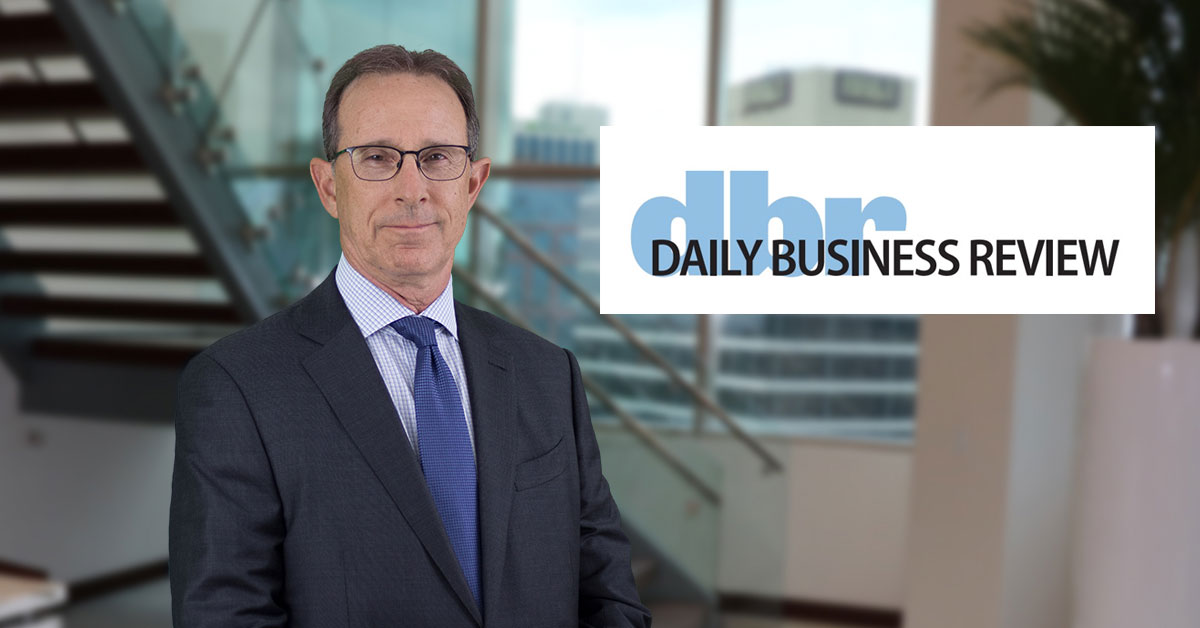 By Michael A. Mora
By Michael A. Mora
Broward litigators seem to have become … nicer… in recent months.
That’s the good news from Chief Judge Jack Tuter, who has gone to great lengths to restore civility among litigators before the Broward Circuit Court.
And interesting factor: The disruption resulting from the coronavirus pandemic might have helped with the shift.
“I would say in the Zoom hearings, based on what I’ve witnessed and the other judges have told me, there’s probably a higher degree of civility than when everyone was in a courtroom,” Tuter said. “You are waiting until I finish, and I am waiting until you finish. That’s a big hurdle in hearing some of these cases!”
But the main question facing Tuter and his fellow judges in Broward County is whether this level of civility among litigators will continue once the coronavirus pandemic passes, or if Interruptions from opposing counsel will persist.
That’s especially important because court administrators expect most litigators to physically return to courtrooms by year’s end.
The circuit’s solution? The continuation of a pilot program using senior law firm partners as professional and civility magistrates, allowing Broward Circuit Court judges to swiftly sanction attorneys who misbehave during litigation.
Now, lawyers no longer have to wait months like they did under the original process for presiding judges to schedule and conduct hearings on sanction motions. Instead, under the new program, special magistrates work on resolving sanction issues within weeks, targeting a 45-day turnaround.
Clients expect ‘bulldogs’
Jamie Cole, a partner at Weiss Serota Helfman Cole & Bierman in Fort Lauderdale and co-chair of the civility program, said the initiative has been on pause since the coronavirus pandemic shut down the court system in mid-March.
Cole said one of the reasons why the program was so successful is that many new lawyers come fresh out of law school and are increasingly starting their own private practice instead of joining a bigger firm where they learn the ropes from more experienced legal practitioners.
“Clients have a lot of demands,” Cole said. “They expect results and expect their attorneys to be bulldogs sometimes, even though that’s not the professional way to do it.”
Jim Haliczer, a partner at Haliczer Pettis & Schwamm in Fort Lauderdale, who is also a committee member, framed the problem differently.
“It just seems when you have over 100,000 licensed attorneys in the State of Florida, you have too many rats and not enough cheese,” Haliczer said.
In the program, these voluntary magistrates hear the cases and recommend what disciplinary action presiding judges might consider against attorneys for offenses that fall outside the scope of The Florida Bar disciplinary proceedings.
During one of his cases, Haliczer worked with a “young lawyer, not a young person,” and based on her bad behavior before a circuit court judge, the seasoned litigator advised her on a better manner by which she could have handled the situation.
But Haliczer pointed out that the program is a serious undertaking and is not just a mentorship program.
And Gary Rosen, managing shareholder at Becker & Poliakoff in Fort Lauderdale and co-chair of the program, said that while no sanctions have been handed out yet, the initiative has solved a real problem that judges, like Tuter, are constantly facing in their courtrooms.
“The only way you’re going to get lawyers to stop behaving unprofessionally and with lack of civility is by exerting some form of deterrent,” Rosen said. “A real deterrent. A meaningful deterrent.”
Rosen said there has been interest from other counties in the state about adopting the civility program. In Broward county, before the pause in the program, one of the hurdles the program faced is having to rely upon the circuit court judges utilizing the new service and recommending that offending lawyers speak with one of the special magistrates. Rosen said it would take some time for judges to become accustomed to having this option to address lack of civility among counsel.
Tuter agreed, but said the wait is worth it as judges look unfavorably upon litigators attacking each other personally, rather than the issues in the case pending before the court.
“Lawyers wanted to do the Joe Biden/Donald Trump-jump-in on top of each other, every time someone says something they don’t agree with, and this has really lessened,” Tuter said. “We intend to continue with this program and continue to make referrals.”
Reprinted with permission from the Daily Business Review.